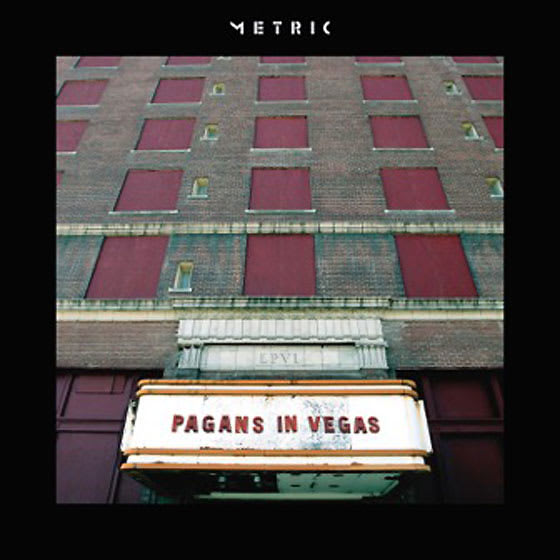Metric wanted to give us their first collection of songs over a decade ago, but 2001's Grow Up And Blow Away, with its eccentric jams and cool compositions, wasn't released until six years later. The delay of the band's unofficial and somewhat experimental debut allowed time for the quartet to work out their signature style — a sexy and sophisticated synth-pop sound that they introduced on Old World Underground, Where Are You Now? (2004) and perfected on Fantasies (2009) and Synthetica (2012).
On their sixth full-length studio album, entitled Pagans in Vegas, most of the tracks are so refined they sparkle. Opening track "Lie Lie Lie" gleams darkly; an eerie synth line creeps along over Shaw's bluesy guitar riff to create the song's ominous tone. Haines skilfully sustains the mood with references to Dylan Thomas's "Do Not Go Gentle Into That Good Night." This attitude lightens slightly on "Fortunes," as the tune's bright and breezy '70s style chorus — which cleverly contrasts the "sinister" electronic verses — is one of the Metric's most dynamic compositions to date. The band's first single, "The Shade," follows; it's perfectly structured and fits the group's radio-friendly formula that produced hits "Gimme Sympathy" and "Breathing Underwater," wrapped in a vintage video game-noise sheen.
Pagans gets a little dull midway through with superficial techno-rock tune "Too Bad, So Sad" and the overly sincere ballad "The Other Side." However, gorgeous musical sequences "The Face part I" and "The Face part II" close out the album and smooth out the imperfections. Patient listening toward the end of Pagans is absolutely rewarded.
(MMI)On their sixth full-length studio album, entitled Pagans in Vegas, most of the tracks are so refined they sparkle. Opening track "Lie Lie Lie" gleams darkly; an eerie synth line creeps along over Shaw's bluesy guitar riff to create the song's ominous tone. Haines skilfully sustains the mood with references to Dylan Thomas's "Do Not Go Gentle Into That Good Night." This attitude lightens slightly on "Fortunes," as the tune's bright and breezy '70s style chorus — which cleverly contrasts the "sinister" electronic verses — is one of the Metric's most dynamic compositions to date. The band's first single, "The Shade," follows; it's perfectly structured and fits the group's radio-friendly formula that produced hits "Gimme Sympathy" and "Breathing Underwater," wrapped in a vintage video game-noise sheen.
Pagans gets a little dull midway through with superficial techno-rock tune "Too Bad, So Sad" and the overly sincere ballad "The Other Side." However, gorgeous musical sequences "The Face part I" and "The Face part II" close out the album and smooth out the imperfections. Patient listening toward the end of Pagans is absolutely rewarded.
